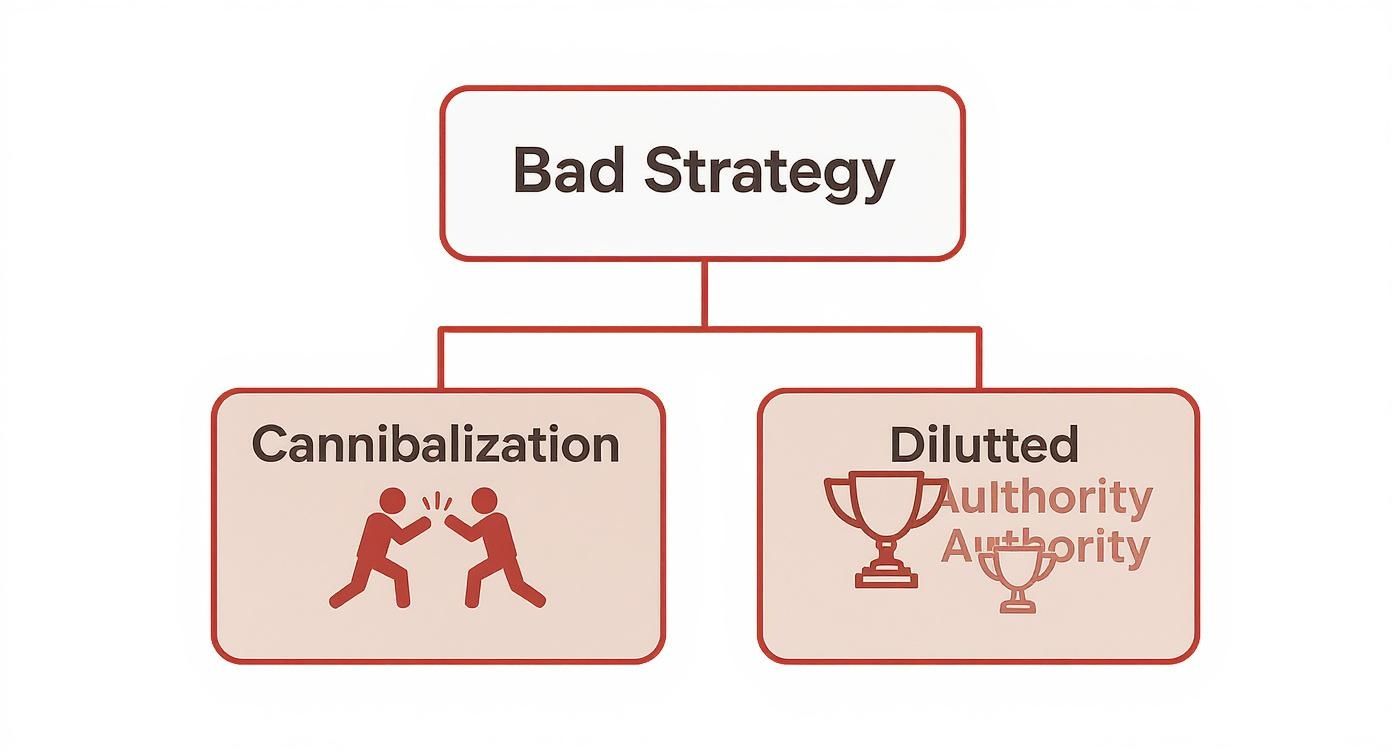Business owners often ask us, "How many keywords do I need for my website?" It's a fair question, but it focuses on the wrong metric. The total count doesn't matter nearly as much as how you use them.
The answer is surprisingly simple: focus each page on one core topic, supported by a small, tightly-knit group of related keywords. Forget chasing a massive, site-wide list. This is about clarity, not quantity.
Why Quality Beats Quantity in Your Keyword Strategy
Think of your website like a sales conversation. If a homeowner in Temecula searches for "emergency plumbing," they have an urgent, specific problem. Your website can't afford to start talking about kitchen remodels. It needs to address their immediate need and related concerns, like "24-hour pipe repair" or "leaky faucet fixes."
Google wants to see that same focused expertise. This approach shifts the goal from just collecting keywords to building genuine topical authority. Instead of trying to be a jack-of-all-trades, you prove you're the go-to expert for one specific thing at a time. This is a foundational concept in modern search engine optimization that builds trust with both search engines and potential customers.
Finding the Sweet Spot for Each Page
The old-school rule of "one keyword per page" is long gone. Today's strategy is about covering a user's entire need on a single topic, comprehensively.
Back in 2020, SEO best practices had already shifted. A detailed analysis of over 1,000 high-performing articles revealed that the average top-ranking page actually ranked for 2.7 keywords. More telling, 68% of these pages used between one and four highly relevant keywords. You can dig into the full keyword usage research to see how this plays out across different industries.
The goal isn’t to stuff more terms onto a page. It's to answer a customer's question so completely that Google sees your page as the definitive resource for that specific problem.
By concentrating on one primary topic per page, supported by just a few closely related terms, you create a clear, powerful signal for search engines. This tells Google exactly what you’re an expert in, making it far more likely to show your page to a customer who needs your help. It’s how a local business becomes the obvious choice online.
A Modern Keyword Strategy at a Glance
So, how does this fit into your overall website? It helps to think about your keyword strategy at different levels: the entire site, specific service categories, and individual pages. Each level has a distinct role.
Here's a breakdown of how we approach keyword targeting to build a powerful, cohesive website:
| Website Level | Strategic Focus | Keyword Guideline |
|---|---|---|
| Site-Wide | Your business's core services & brand | 2-5 "money" keywords (e.g., "Temecula plumber") |
| Section/Category | Specific service lines or product types | 10-15 keywords per section (e.g., "water heater repair") |
| Individual Page | A single, focused user question or need | 1-4 highly related keywords (e.g., "leaking water heater cost") |
This tiered approach ensures your entire site works together. Your individual pages build authority that rolls up to support your main service categories, which in turn establishes your overall business as a leader in its field. It’s a smart, scalable way to build relevance that drives results.
Keyword Clusters: The Secret to Topical Authority
This page-level strategy of using 1-4 related keywords is often called keyword clustering. Instead of treating keywords as isolated targets, you group them based on user intent.
Think of it like chapters in a book. Your main service page might be the chapter title, like "Drain Cleaning Services." The keyword clusters are the subheadings and paragraphs within that chapter, covering topics like "how to unclog a kitchen sink," "hydro jetting services," and "signs of a clogged main sewer line."

This method lets you create incredibly comprehensive content that answers a user's primary question and all their follow-up questions in one place. You're not just targeting a single search query; you're covering an entire topic. That's what Google rewards.
Why Chasing More Keywords Can Hurt Your Rankings
It’s a common misconception: more keywords equals more traffic. On the surface, it makes sense. Cast a wider net, catch more fish, right? In reality, this approach often backfires, hurting your rankings more than it helps.
Think of it this way. Imagine a food truck that’s famous for the best tacos in town. It has a clear identity. People know exactly what they’re getting. Now, what if that truck suddenly started selling tacos, pizza, sushi, and BBQ? It loses its specialty. It becomes generic, forgettable, and probably not very good at any of it. Your web pages are no different.
When you try to stuff one page with a dozen different keywords, you're not telling Google you're an expert. You're just creating noise. This leads to two major problems that can quietly sink your SEO efforts.
The Problem of Keyword Cannibalization
First up is keyword cannibalization. This is what happens when multiple pages on your own website compete for the exact same search terms. You're accidentally pitting your own content against itself, forcing Google to guess which page is the real authority.
Most of the time, Google can't make a clear choice, so it just ranks both of them lower.
For instance, a roofer might create one page for "roof repair services" and another for "emergency roof leak repair." It seems logical, but both pages are chasing the same customer need. This internal conflict confuses search engines and dilutes your authority, preventing either page from ranking as well as a single, consolidated page would have.
A study within the HubSpot community found that blog posts aiming for more than three long-tail keywords were 41% more likely to suffer from cannibalization. For the sites in the study, this self-inflicted competition led to a 19% drop in their overall organic traffic. You can dig into the full findings on keyword strategy yourself.
Diluting Your Page Authority
The second issue is diluted authority. Every page on your website has a certain amount of ranking potential. When you cram a single page with a jumble of disconnected ideas—like "roof replacement," "siding installation," and "gutter cleaning"—you spread that potential way too thin.
Your page becomes a jack-of-all-trades and master of none.
By trying to be everything to everyone, the page ends up being nothing special to anyone. It fails to build the deep, focused authority that Google needs to see before it trusts you with its users.
Instead of sending a strong, clear signal about one topic, you’re sending a weak, fuzzy signal about many. A competitor with a page dedicated only to roof replacement will beat your catch-all page every single time.
Building Authority by Thinking in Topics, Not Keywords
So, how do you fix keyword cannibalization and diluted authority? The solution is a mental shift—one that separates websites that churn out leads from those that just sit there. It's time to start thinking in topics, not just a random list of keywords.
This is where the topic cluster model shines. It’s a strategic way to structure your content that signals deep expertise to Google, making your entire site more authoritative and trustworthy.
Your Website as a Knowledge Hub
Picture your main service page—let's say "Commercial HVAC Repair" for a local contractor—as the center of a wheel. This is your core, money-making page, aimed squarely at the search term someone uses when they need to hire you. This is your "hub."
Now, think about the spokes of that wheel. Each spoke is a different blog post or informational page answering a specific, related question your potential customers are asking.
- Spoke 1: A blog post on "5 Signs Your Commercial AC Needs Repair."
- Spoke 2: An article breaking down the "Average Cost of HVAC Maintenance for Businesses."
- Spoke 3: A guide on "Choosing the Right HVAC System for a Small Office."
Every one of these "spoke" pages links back to your central "hub" page. This sends a powerful message to Google: “Hey, we don’t just offer commercial HVAC repair; we’re a comprehensive authority on the entire subject.” You're not just trying to make a sale; you're providing real value and answering every question a buyer might have.
This infographic shows what happens with the opposite approach—a lack of structure that leads to common keyword mistakes.

As you can see, a scattered strategy just makes your own pages fight each other for rankings (cannibalization) and waters down your expertise. It's a recipe for going nowhere fast.
Grouping Keywords by Customer Intent
The real magic happens when you group keywords based on what your customer is trying to accomplish—their intent. Someone searching "signs of a bad AC unit" isn't ready to pull out their credit card. They're in the information-gathering stage. Your blog post (a spoke) meets them right there, building trust from the first click.
After they’ve self-diagnosed the issue, their next search might be "commercial HVAC repair near me." That’s when your service page (the hub) needs to show up, perfectly positioned to turn that search into a solid lead.
By organizing your content this way, your website transforms from a simple digital brochure into an indispensable guide. It builds a relationship with customers before they even pick up the phone.
This is a much smarter strategy than trying to stuff every keyword variation onto a single page. In fact, we've found one of the fastest ways to rank is by focusing on a single, powerful topic for each page. You can read more in our guide on why we rank websites with single pages, which dives into how this laser-focused approach builds authority. It’s the system that turns your website into a predictable, lead-generating machine.
Your Practical Keyword Plan for Business Growth
Theory is great, but it won't land you new customers. Let's move from concepts to concrete examples and show you exactly how a modern keyword strategy works for real businesses. This is where you can start to see what’s missing in your current approach and what’s possible when you get it right.
We'll map out a practical keyword plan for three common business types: a local auto shop, a niche e-commerce store, and a B2B consulting firm. Notice how each page is designed to target a specific customer need and how the keywords create a clear, logical cluster around that topic.
Blueprint for a Local Auto Shop
A local service business, like an auto repair shop in Menifee, lives and dies by attracting customers in a specific geographic area. The keyword strategy here has to be intensely local and focused on solving immediate problems. For these types of companies, this precision is non-negotiable. You can dive deeper into this in our guide on SEO for service-based businesses.
- Homepage: Think of the homepage as your digital storefront. It needs to target broad, branded terms like "Menifee auto repair" and "mechanic near me." Its job is to quickly establish who you are, where you are, and what you do.
- Service Page (The Hub): A dedicated page for "Brake Repair Services" is a perfect example of a topic hub. Its primary keyword is "brake repair Menifee."
- Keyword Cluster (The Spokes): This page should also naturally include terms that answer related questions a potential customer might have. Think "cost to replace brake pads," "squeaking brakes diagnosis," and "brake fluid change service." Each of these terms supports the main topic, proving your comprehensive expertise to Google and your customers.
Blueprint for an E-commerce Store
An e-commerce business selling handmade goods needs to capture buyers with specific tastes. The focus shifts from local intent to product features, benefits, and the unique problems the product solves.
- Category Page (The Hub): This page groups similar products together, like "Handmade Leather Wallets." Its primary keyword would be something like "handmade leather wallets for men."
- Keyword Cluster (The Spokes): To attract discerning buyers, the page should also aim to rank for specific variations like "full grain leather bifold wallet," "men's minimalist wallet," and "custom engraved leather wallet." These keywords capture different stages of the buying journey, from broad interest to specific purchase intent.

This approach moves beyond simply listing products. It frames your offerings around the specific terms and features your ideal customers are actively searching for. That's how you turn browsers into buyers.
Blueprint for a B2B Consultant
A B2B consultant sells expertise, not a physical product. Because of this, the keyword strategy has to build trust and authority by targeting the specific business challenges their clients face.
- Solution Page (The Hub): A core offering like "Sales Team Training" gets its own dedicated page. Here, the primary keyword might be "b2b sales training programs."
- Keyword Cluster (The Spokes): This page needs to attract decision-makers who are looking for tangible outcomes. It should incorporate keywords that reflect those goals, like "how to improve sales conversions," "effective sales coaching techniques," and "corporate sales workshops."
Seeing these blueprints side-by-side reveals a universal principle: every page on your website should have one clear job. Whether you're fixing cars or training sales teams, a focused keyword strategy is what turns your website from a simple brochure into a system that consistently attracts the right customers.
Keyword Strategy Examples by Business Type
| Business Type | Page Example | Core Topic | Keyword Cluster Example |
|---|---|---|---|
| Local Service Business | Brake Repair Page | Brake Repair in Menifee | "cost to replace brake pads," "squeaking brakes diagnosis," "brake fluid change" |
| E-commerce Store | Product Category Page | Handmade Leather Wallets | "full grain leather wallet," "men's minimalist wallet," "custom engraved wallet" |
| B2B Company | Solution Page | B2B Sales Training | "improve sales conversions," "sales coaching techniques," "corporate sales workshops" |
As you can see, the structure is the same even if the specifics change. It all comes down to identifying a core topic for each page and then supporting it with a cluster of related, specific keywords that answer every question a user might have.
How We Build a Keyword Strategy That Works
A great SEO strategy isn't guesswork or blindly following the latest trends. It's a repeatable system designed to generate real business leads. We don't just pluck keywords out of thin air because they sound good; we build a detailed map that connects your business goals directly to what your ideal customers are searching for.
This is a world away from how things used to be done. A decade ago, SEOs would often focus on a single keyword for each page. In fact, old surveys show that over 75% of SEO professionals stuck to this one-keyword-per-page rule, terrified of getting hit with a "keyword stuffing" penalty. You can get the full story on how keyword strategies have evolved over time on keywordinsights.ai.
Today, the process is far more sophisticated. Our focus is on building a true lead generation asset for your business—not just another website.
Our Three-Step Strategic Process
Our approach is built around clarity and measurable results. We start with your business goals and work backward, creating a website structure that delivers predictable growth and acts as your 24/7 salesperson.
Here’s how we break it down:
- Identify Your "Money" Keywords: First, we pinpoint the core services or products that actually make you money. These are your high-intent, "ready to buy" terms. Think "kitchen remodeling contractor" for a builder, not a vague term like "kitchen ideas."
- Build Topic Clusters: From there, we build outward. We dig into every question, problem, and piece of information your customers look for before making a decision. This research becomes the foundation for your topic clusters, creating a web of interconnected content that establishes you as the go-to expert.
- Map Keywords to Site Structure: Finally, we take this entire keyword ecosystem and map it to a logical site structure. The "money" keywords belong on your core service pages. The supporting questions and topics get their own dedicated blog posts and guides.
This structured approach does more than just organize your content; it creates a clear pathway for both users and search engines. It proves your authority and makes it easy for customers to find exactly what they need, building trust from the very first click.
This isn't a "set it and forget it" task. It’s an ongoing cycle of monitoring performance, finding new keyword opportunities, and tweaking the strategy to ensure your website continues to work as hard as you do. This is how we move beyond just building websites and start creating predictable systems for business growth.
Your Questions About Keyword Strategy Answered
Even with a roadmap, questions are normal. Making the jump from stuffing keywords to building a smart, topic-focused strategy is a big shift, but it's the secret to creating a website that actually brings in business.
Let's tackle some of the most common questions we get from business owners.
How many keywords should my homepage target?
Think of your homepage as the big sign above your shop's front door. It needs to clearly state who you are and what you do at a high level, not list every single item on the shelves. For a roofer in Chicago, that means focusing on their company name and a broad term like "Chicago roofing contractor."
We typically aim for 3-5 broad, brand-centric keywords on a homepage. This keeps the message powerful and focused. All those specific service keywords—like "shingle roof repair" or "commercial flat roofing"—belong on their own dedicated pages where they have the best shot at ranking and connecting with the right customers.
Should I update keywords on old blog posts?
Absolutely. We call this "content refreshing," and it's one of the most powerful, overlooked tactics out there. If you have an old blog post that’s getting no traffic, don't write it off. It probably just needs a tune-up.
We constantly go back and analyze a post's topic and keyword focus. Is it still answering the right questions? By updating it with fresher information and smarter keywords from its topic cluster, you can often see a major jump in rankings without having to write a whole new article from scratch. It’s all about getting more mileage out of what you’ve already built.
Treat your content like a valuable asset that should grow in value over time, not a disposable flyer you toss after a week. It’s a much smarter way to think about your marketing investment.
How long does a new keyword strategy take to show results?
SEO is a long game. It's about building sustainable growth, not getting a quick, temporary fix. When you build a solid keyword strategy based on topic clusters, you can generally expect to see real movement—like more organic traffic and better leads—within 3 to 6 months.
Of course, the exact timing depends on how competitive your industry is and how much authority your website already has. Our entire approach is about building a rock-solid foundation that turns your website into a 24/7 salesperson that works for you for years, not just a few weeks.
Can I rank in a city where I don't have an office?
Yes, but you have to be deliberate about it. For any local business, Google gives a huge advantage to companies with a physical address in the city someone is searching from. Just tacking a city name onto your keywords won't cut it.
The right way to rank in a neighboring city is to create a dedicated location page with unique content about your work in that specific area. This page needs to prove you belong there. It should include:
- Local Project Examples: Show off photos and stories of work you've done in that town.
- Customer Testimonials: Feature reviews from happy clients who live there.
- Area-Specific Details: Mention local landmarks, neighborhoods, or anything that shows a real connection to the community.
This strategy sends a strong signal to Google that you have a legitimate presence there, which dramatically improves your chances of showing up in their local search results.
Feeling clearer on your keyword strategy but not sure how to put it into practice for your own business? At Uncommon Web Design, we don't just build websites; we build lead-generation systems. We can help you create a keyword map that turns searchers into paying customers.
Book a no-obligation consultation today and let’s put together a real plan for your growth.



